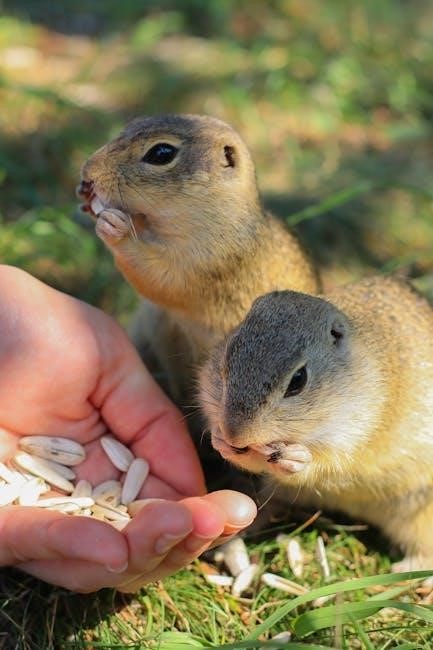Welcome to our guide on legal pets in Illinois! This section explores the variety of pets allowed under Illinois law, including traditional, exotic, and wildlife species. Understanding these regulations is essential for responsible pet ownership in the state.
From dogs and cats to reptiles and birds, Illinois provides a framework for legal pet ownership. Certain exotic pets require permits, while others are banned to protect public safety and the environment. Health certificates and vaccinations are also crucial for ensuring compliance with state laws.
Overview of Pet Laws and Regulations in Illinois
Illinois pet laws are designed to ensure animal welfare and public safety. The state regulates ownership of traditional pets, exotic animals, and wildlife, requiring permits for certain species. Prohibited animals include dangerous wildlife like big cats and venomous snakes. Licensing and health certificates are mandatory for breeders and sellers. Local ordinances may restrict pet types or numbers. Authorities enforce these laws to prevent illegal pet ownership and protect native ecosystems. Penalties for violations include fines and legal action, emphasizing the importance of compliance with Illinois pet regulations.
Importance of Understanding Legal Pets in Illinois
Understanding Illinois pet laws is crucial for responsible ownership and compliance with state regulations. Knowing which animals are legal, prohibited, or require special permits ensures pet owners avoid legal consequences. Proper licensing, health certificates, and vaccinations are essential for maintaining legal status. Additionally, recognizing restrictions on exotic and invasive species helps protect native ecosystems. Violations can lead to fines or confiscation of pets, making awareness of these laws vital. By understanding legal requirements, residents can enjoy pet ownership while contributing to public safety and environmental conservation in Illinois.

Categories of Legal Pets in Illinois
Illinois permits common household pets, exotic animals needing permits, and native species with documentation, ensuring diverse and regulated pet ownership.
Common Household Pets
Common household pets in Illinois include dogs, cats, birds, fish, and small mammals like hamsters and gerbils. These animals are widely accepted and legally permitted without special permits. Many residents keep these pets for companionship and emotional support. Illinois law treats these animals as traditional pets, with no specific restrictions beyond standard licensing and vaccination requirements. Owners are encouraged to follow local ordinances and ensure the well-being of their pets. These household pets are popular due to their ease of care and legal status, making them ideal choices for families and individuals alike.
Exotic Pets and Their Legal Status
Exotic pets in Illinois are subject to specific regulations to ensure public safety and animal welfare. Certain species, like arctic foxes, require a fur-bearing mammal breeder permit and must be purchased from USDA-licensed breeders. Birds such as toucans and ostriches are permitted, as are reptiles like monitor lizards and nonvenomous snakes. However, big cats, bears, and dangerous wildlife are strictly prohibited. Illinois law balances the rights of exotic pet owners with concerns for safety and conservation. Owners must comply with licensing and health requirements to legally keep these unique animals.
Wildlife and Native Species as Pets
In Illinois, keeping wildlife or native species as pets is heavily regulated to protect ecosystems and public safety. Native herptiles, such as certain turtles and snakes, may require permits and must be obtained legally. Invasive species, like bighead carp or Eurasian ruffe, are prohibited to prevent ecological harm. Wildlife such as deer, raccoons, or foxes are generally not allowed as pets due to ethical and safety concerns. Illinois law prioritizes conservation and biodiversity, restricting the possession of native animals to ensure their welfare and the balance of natural environments. Permits for native species are issued under strict conditions to maintain ecological integrity.
Specific Animals and Their Legal Status
In Illinois, the legal status of pets varies widely. Dogs, cats, and traditional pets are widely permitted, while exotic animals like arctic foxes require special permits; Certain wildlife, such as native species, are protected, and keeping them as pets is restricted. Reptiles and birds, including nonvenomous snakes and toucans, are generally allowed but may require documentation. Prohibited animals include dangerous exotic species and invasive wildlife, which threaten local ecosystems. Licensing and permits are essential for legal ownership of certain pets, ensuring compliance with state regulations and preventing illegal possession. This framework balances pet ownership rights with environmental and public safety concerns.
Dogs, Cats, and Other Traditional Pets
Dogs, cats, and other traditional pets are widely permitted in Illinois, with specific regulations ensuring their welfare and public safety. Licensing requirements vary by county, but most mandate annual vaccinations and health certificates. Breed-specific laws, such as those targeting pit bulls, may apply in certain jurisdictions. Service animals, including dogs and miniature horses, enjoy legal protections under state and federal laws, allowing them in public spaces and housing. Emotional support animals, while distinct from service animals, also have rights but require documentation. Illinois law emphasizes responsible ownership, balancing pet rights with community safety and environmental concerns.
Reptiles and Amphibians as Pets
Illinois permits a variety of reptiles and amphibians as pets, including nonvenomous snakes, lizards, and frogs. Many species are allowed without special permits, but exotic or venomous ones may require authorization. Owners must ensure their pets do not threaten public safety or native ecosystems. For example, certain invasive species, like the African clawed frog, are restricted. Health certificates and proper care guidelines are essential to maintain both animal welfare and environmental balance. Illinois law aims to protect biodiversity while allowing responsible ownership of these unique pets.
Birds and Exotic Avian Species
In Illinois, many birds and exotic avian species are permitted as pets, including toucans, ostriches, and certain parrots. However, ownership is regulated to prevent ecological harm and ensure animal welfare. Exotic birds like macaws and cockatoos are generally allowed, but invasive or endangered species require special permits. Illinois law prohibits releasing non-native birds into the wild to protect local ecosystems. Owners must also comply with health and safety standards, ensuring proper care and housing for these unique pets. Responsible ownership of avian species helps maintain biodiversity while enriching pet-keeping experiences.
Fish and Aquatic Pets
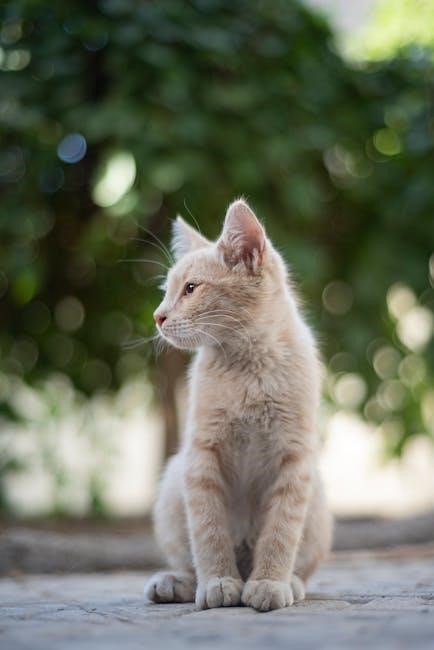
Fish and aquatic pets are popular in Illinois, with many species permitted under state law. Common legal aquatic pets include goldfish, koi, and tropical species like guppies and neon tetras. However, invasive species such as Asian carp and zebra mussels are strictly prohibited to protect local ecosystems; Ownership of non-native aquatic pets may require permits, and some species are restricted due to environmental concerns. Illinois regulations also limit the number of certain fish that can be kept to prevent overpopulation and ecological damage. Always verify legal requirements before acquiring aquatic pets to ensure compliance with state environmental and wildlife laws.
Small Mammals and Rodents
Small mammals and rodents are widely kept as pets in Illinois, with many species permitted under state law. Common legal pets include hamsters, gerbils, guinea pigs, and rabbits. These animals are popular due to their small size and relatively low maintenance care. However, certain non-native rodents, such as ferrets, may require special permits or face restrictions. Illinois regulations also emphasize the importance of obtaining pets from licensed breeders to ensure health and safety standards. Additionally, exotic rodents not native to the region may be subject to specific legal restrictions to prevent ecological disruptions. Always verify local laws before acquiring small mammals or rodents as pets.
Large Animals and Livestock
In Illinois, large animals and livestock, such as cattle, horses, goats, and sheep, are generally permitted as pets, provided they comply with local zoning and agricultural regulations. Exotic livestock, like llamas or alpacas, may require special permits. Zoning laws often restrict where these animals can be kept, particularly in urban areas. Health certificates and vaccinations are typically mandatory to ensure public safety and disease control. Additionally, some large animals may be classified as “dangerous” under state law, requiring liability insurance. Always verify with local authorities to ensure compliance with regulations before keeping large animals or livestock as pets.

Legal Restrictions and Prohibitions
Illinois prohibits certain exotic and dangerous animals as pets, including big cats, bears, and venomous reptiles. Invasive species and endangered animals are also restricted to protect ecosystems and wildlife.
Prohibited Exotic Pets in Illinois
Illinois prohibits ownership of certain exotic pets deemed dangerous or invasive. Big cats, bears, wolves, and venomous snakes are banned to protect public safety and native ecosystems. The state also restricts invasive species like Eurasian ruffe and silver carp to prevent ecological harm. Violations of these restrictions can result in penalties, including fines and confiscation of the animal. Additionally, the Illinois Humane Care for Animals Act ensures that prohibited pets are handled responsibly. Legal exceptions exist for specific species, such as non-venomous snakes, but require special permits. Understanding these laws is crucial for ethical and lawful pet ownership in Illinois.
Endangered Species and Protected Animals
Illinois law strictly protects endangered species and native wildlife, aligning with federal regulations. The Illinois Endangered Species Protection Act prohibits possession, sale, or harm to listed species, such as the eastern box turtle and Indiana bat. Certain protected animals, like migratory birds, are also safeguarded under federal laws. The state collaborates with conservation efforts to preserve biodiversity. Violating these protections can lead to legal penalties, emphasizing the importance of respecting wildlife conservation laws in Illinois.
- Protections apply to both animals and their habitats.
- Endangered species require special permits for handling.
- Violations may result in fines or legal action.
- Invasive species are legally restricted to safeguard native ecosystems.
- Releasing invasive species into the wild is strictly prohibited.
- Violations may lead to significant fines and legal action.
- Exotic pets often need special permits from state authorities.
- Breeders must meet specific licensing criteria to operate legally.
- Health certificates and vaccinations are mandatory for certain animals.
- USDA permits may be required for non-native species.
Invasive Species and Their Legal Implications
Illinois law prohibits the possession, sale, or release of invasive species that threaten local ecosystems. Species like bighead carp, zebra mussels, and Eurasian ruffe are banned due to their harmful impact on native wildlife and the environment. Violations can result in fines and penalties under the Illinois Invasive Species Act. These regulations aim to prevent ecological damage and protect biodiversity. Residents must be aware of prohibited species to avoid legal consequences and contribute to conservation efforts.
Licensing and Permitting Requirements
Obtaining proper licenses and permits is essential for legal pet ownership in Illinois. Requirements vary depending on the type of pet and its origin.
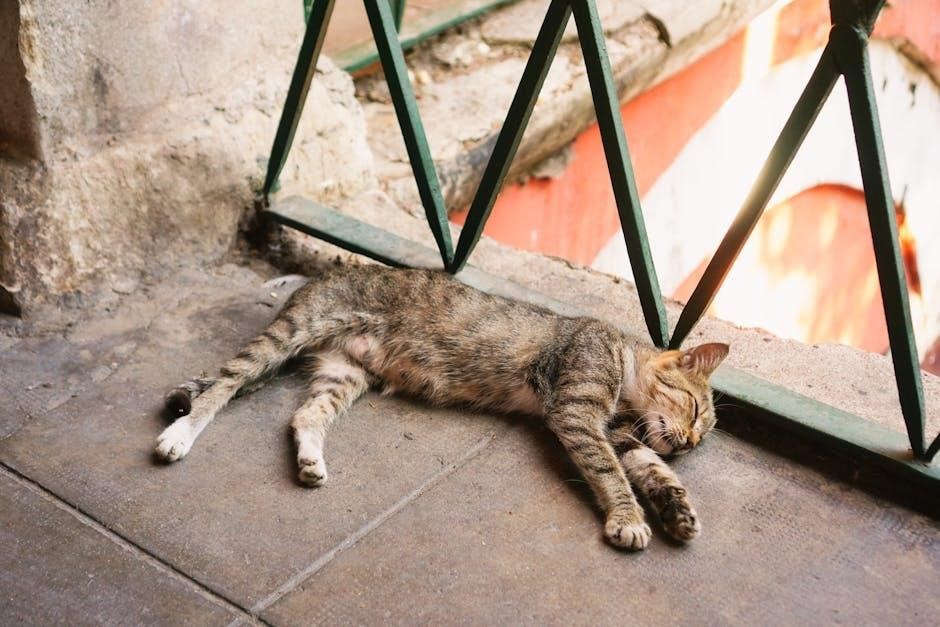
Obtaining Permits for Exotic Pets

Obtaining permits for exotic pets in Illinois ensures compliance with state and federal regulations. Exotic animals, such as arctic foxes, require specific permits like fur-bearing mammal breeder permits. These permits guarantee the animal is legally sourced and handled safely. Applicants must meet criteria set by the Illinois Department of Natural Resources and the USDA. Failure to obtain proper permits can result in legal penalties. Permits also ensure public safety and environmental protection, as some exotic pets may pose risks if not managed properly.
Licensing for Breeders and Sellers
Licensing for breeders and sellers in Illinois ensures ethical and legal standards are met. The state requires breeders to obtain permits, with criteria outlined in Appendix B of Illinois regulations. Sellers must also comply with licensing laws to operate legally. The Illinois Department of Natural Resources (IDNR) and USDA regulate these activities. Proper documentation and adherence to health standards are mandatory. Penalties for non-compliance include fines and legal action. Licensing ensures transparency, accountability, and protection for both animals and consumers, maintaining the integrity of the pet trade in Illinois.
Health Certificates and Vaccinations
Health certificates and vaccinations are critical for ensuring the well-being of pets and compliance with Illinois laws. All pets, including dogs, cats, and birds, must have up-to-date vaccinations. Health certificates are required for animals entering the state, verifying they are disease-free. Core vaccinations, such as rabies for dogs and cats, are mandatory. Breeders and sellers must maintain accurate vaccination records. Failure to comply can result in penalties. These requirements protect both animals and public health, ensuring a safe and responsible pet-keeping environment in Illinois.

Service Animals and Emotional Support Animals
Service animals, trained to assist individuals with disabilities, are legally protected under the ADA. Emotional support animals provide comfort but lack the same legal protections. Both require documentation.
Legal Protections for Service Animals
Service animals in Illinois are protected under the Americans with Disabilities Act (ADA) and state laws. They are legally permitted in public spaces, housing, and transportation. The Service Animal Access Act prohibits discrimination against individuals with service animals, ensuring equal access to all facilities. Violations of these protections are classified as misdemeanors, with penalties including fines and legal action. Illinois law also safeguards the rights of service animals, emphasizing their role in assisting individuals with disabilities. These protections are essential for promoting inclusivity and ensuring the rights of service animal owners are upheld across the state.
Emotional Support Animals and Their Rights
Emotional support animals (ESAs) in Illinois are recognized under the Fair Housing Act, ensuring housing accommodations for individuals with mental or emotional disabilities. While ESAs are not granted the same public access rights as service animals, they are protected in housing and some transportation contexts. Illinois law requires documentation from a licensed healthcare provider to validate an ESA’s status. Recent changes in state and federal regulations have clarified distinctions between ESAs and service animals, emphasizing the need for proper documentation to uphold legal rights. Understanding these protections is crucial for individuals relying on ESAs for emotional well-being.
Differences Between Service and Emotional Support Animals
Service animals and emotional support animals (ESAs) are both assistive animals but serve distinct purposes. Service animals are specially trained to perform tasks for individuals with disabilities, such as guiding the blind or alerting the deaf. ESAs, however, provide emotional comfort and are not trained for specific tasks. Under Illinois law, service animals have full public access rights, while ESAs are protected primarily in housing under the Fair Housing Act. Documentation requirements differ: service animals require proof of training, while ESAs need a letter from a healthcare provider. Understanding these distinctions is key to navigating legal protections and responsibilities.
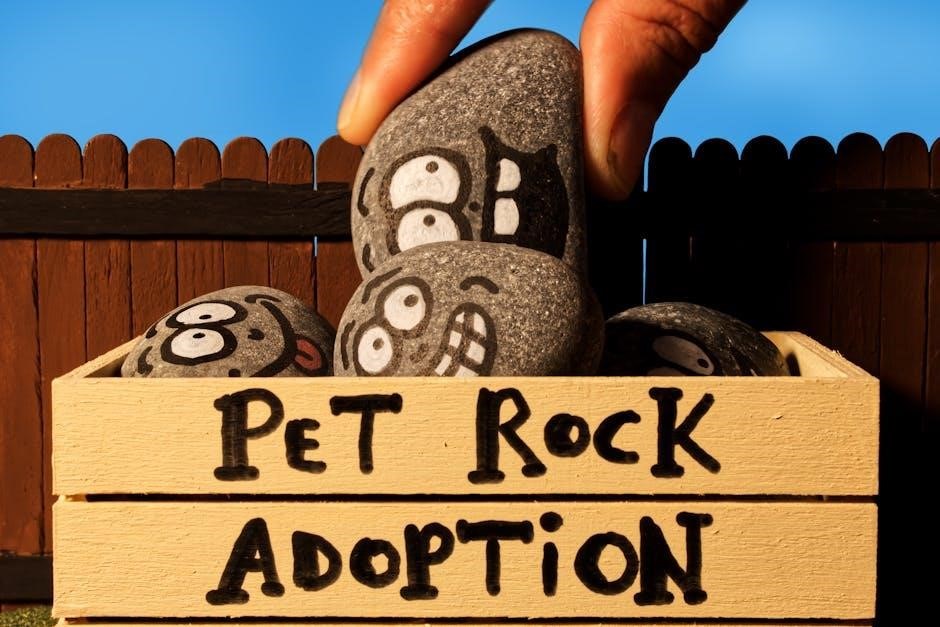
Local Ordinances and Zoning Laws
Local Illinois ordinances and zoning laws regulate pet ownership, varying by county and city. Chicago, for example, has specific rules about exotic pets, while rural areas may permit larger animals. These laws ensure public safety and environmental balance.
County and City-Specific Pet Laws
Illinois pet laws vary significantly by county and city, with local ordinances often stricter than state regulations. For instance, Chicago has specific rules about exotic pets, while smaller towns may allow larger animals. Cook County requires licenses for certain pets, and DuPage County restricts ownership of animals deemed invasive or dangerous. Some municipalities ban specific breeds or limit the number of pets per household. Homeowners’ associations may also impose additional rules. It’s essential to check local ordinances before bringing a pet home to ensure compliance with all applicable laws and regulations.
Zoning Restrictions for Certain Pets
Zoning laws in Illinois regulate where certain pets can be kept, balancing land use with animal ownership. Urban areas often restrict livestock and exotic pets to maintain residential character, while rural zones may permit larger animals. Specific permits or licenses are required for keeping animals like chickens or horses in residential zones. Homeowners’ associations may also enforce stricter rules. These restrictions aim to preserve property values and ensure public safety. Pet owners must comply with local zoning ordinances to avoid legal issues. Always verify zoning rules before acquiring a pet to ensure it fits within your area’s regulations.
Homeowners’ Association Rules and Pets
Homeowners’ Associations (HOAs) often impose specific rules regarding pets within their communities. These rules may include restrictions on the size, breed, or number of pets allowed. Some HOAs prohibit certain exotic or noisy animals, while others require pet owners to maintain clean yards or use leashes. Violations of these rules can lead to fines or legal action. It’s essential for residents to review their HOA agreements to understand pet-related regulations. These rules aim to maintain community harmony and property values, ensuring a balanced environment for both pet owners and non-pet owners alike within the neighborhood.
Enforcement of Pet Laws in Illinois
Animal Control and local law enforcement agencies are responsible for enforcing pet laws in Illinois. They ensure compliance with regulations, issue penalties for violations, and protect public safety and animal welfare through active monitoring and community engagement.
Role of Animal Control and Law Enforcement
Animal Control and law enforcement agencies in Illinois play a crucial role in enforcing pet laws. They monitor compliance with regulations, respond to violations, and ensure public safety. Officers investigate illegal pet ownership, seize prohibited animals, and educate the public on legal requirements. Collaboration with local authorities helps maintain community welfare and protect both residents and animals. Their efforts are vital in upholding the state’s legal framework for pet ownership and wildlife conservation.
Penalties for Violating Pet Laws
Violating Illinois pet laws can result in various penalties, including fines, misdemeanors, and even felony charges. Fines range from $500 to $5,000, depending on the severity. Repeat offenses may lead to higher penalties. Prohibited pet ownership, such as keeping dangerous exotic animals, can result in criminal charges. Additionally, authorities may seize illegal pets, and owners may face legal action for endangering public safety or wildlife. Compliance with state and local regulations is essential to avoid legal consequences and ensure the well-being of both pets and communities.
Reporting Illegal Pets or Violations

Illinois residents can report illegal pets or violations to local animal control or law enforcement agencies. Contacting authorities ensures compliance with state laws and protects public safety. Reports can be made anonymously or through official channels. Providing details about the violation, such as location and type of animal, aids enforcement. Violations may include owning prohibited exotic pets or failing to obtain necessary permits; Reporting helps prevent harm to communities and wildlife, ensuring legal pet ownership standards are upheld. Prompt action by authorities addresses concerns effectively, maintaining balance between pet rights and public welfare.
Recent Changes and Updates to Pet Laws
Illinois has introduced updated regulations in 2023, including new permit requirements for exotic pets and stricter penalties for invasive species to protect biodiversity and public safety.
2023 Updates to Illinois Pet Laws
In 2023, Illinois introduced significant updates to pet laws, focusing on exotic pet ownership and invasive species control. New regulations require stricter permits for certain exotic animals, such as arctic foxes and venomous reptiles. Penalties for possessing prohibited species, like bighead carp and silver carp, were increased to protect native ecosystems. Additionally, the state clarified rules for emotional support animals, aligning them with federal guidelines. These changes aim to balance pet ownership rights with public safety and environmental protection. Owners of exotic pets must now provide detailed documentation and adhere to stricter health protocols.
Future Trends in Pet Legislation
Future pet legislation in Illinois may focus on stricter regulation of invasive species and exotic pets. There is a growing emphasis on environmental protection and public safety. Expanding the list of prohibited animals, like invasive fish species, is likely. Additionally, digital tracking systems for exotic pet permits could be introduced to enhance compliance. Public awareness campaigns about illegal pets are expected to increase. These trends reflect a broader shift toward sustainable and responsible pet ownership, ensuring that Illinois remains a leader in animal welfare and environmental stewardship while adapting to evolving societal needs and ecological challenges.
Public Response to Changes in Pet Laws
Public response to changes in Illinois pet laws has been mixed. Many support stricter regulations on invasive species and exotic pets, citing environmental protection and safety concerns. Others oppose new restrictions, arguing they infringe on personal freedoms. Pet owners, especially those with exotic animals, have expressed concerns about losing their pets or facing legal penalties. Awareness campaigns about illegal pets have increased public understanding, but debates continue. The state aims to balance public safety with pet ownership rights, ensuring responsible laws that protect both residents and ecosystems while addressing evolving societal and ecological challenges.
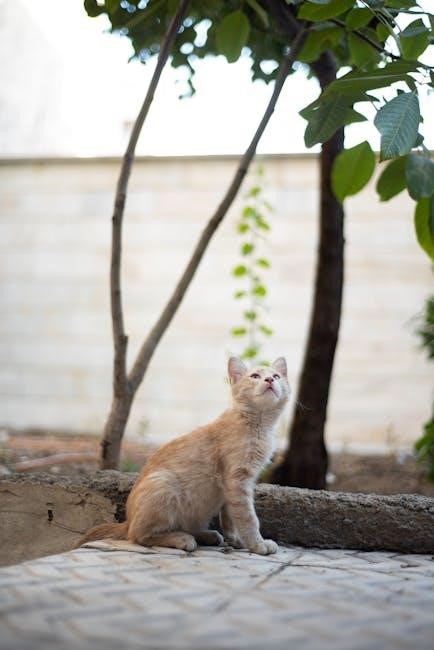
Illinois has comprehensive regulations governing legal pets, balancing traditional and exotic ownership. Permits are required for exotic animals, with certain species prohibited to ensure public safety and environmental protection. Health certificates and vaccinations are mandatory for compliance. The state distinguishes between service animals, emotional support animals, and traditional pets, with specific protections under the law. Local ordinances and zoning laws add additional layers of regulation. Understanding these rules is crucial for responsible pet ownership, ensuring harmony between owners, animals, and the community.
Importance of Adhering to Pet Laws
Adhering to Illinois pet laws is vital for maintaining public safety, protecting the environment, and ensuring animal welfare. Legal compliance prevents the introduction of invasive species, protects endangered animals, and safeguards communities from potential risks. Violations can result in fines, penalties, or confiscation of pets. Understanding and following these regulations fosters a harmonious relationship between pet owners and their surroundings. It also ensures that pets receive proper care and are kept in safe, lawful conditions, benefiting both the animals and society as a whole.
Resources for Further Information
For detailed information on legal pets in Illinois, consult the Illinois Department of Natural Resources (IDNR) and the Illinois General Assembly (ILGA) websites. These sources provide comprehensive lists of permitted and prohibited pets, along with licensing requirements. Additionally, local animal control agencies and the University of Illinois Extension offer guidance on exotic and native species. Refer to the Illinois state website for downloadable PDFs and updated regulations. These resources ensure accurate and up-to-date information for responsible pet ownership in Illinois.
